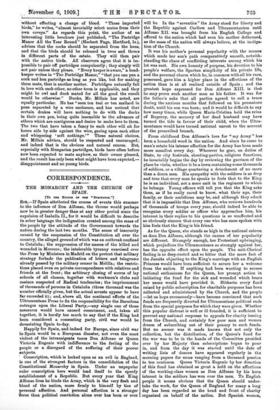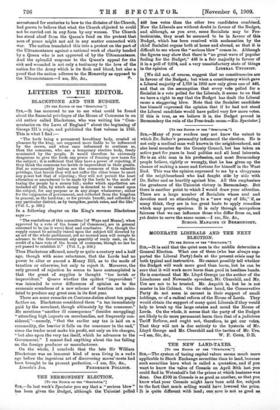CORRESPONDENCE.
THE MONARCHY AND THE CHURCH OF SPAIN.
rro THE EDITOR 07 TICII " SPECTATOR...1 SIE,-If Spain attributed the course of events this summer to the influence of D.on Alfonso, the throne would perhaps now be in greater danger than at any other period since the expulsion of Isabella II., for it would be difficult to describe in sober language the indignation created among the mass of the people by the attitude of the Government towards the nation during the last two months. The sense of insecurity caused by the suspension of the Constitution all over the country, the alleged ground of which was an outbreak confined to Cataluna; the suppression of the names of the killed and wounded in Morocco ; the intolerable tyranny exercised over the Press by Ministers in Madrid on the pretext that military strategy forbade the publication of letters and telegrams already passed by the military censor in Melilla; the restric- tions placed even on private correspondence with relatives and friends at the front; the arbitrary closing of scores of lay schools of all classes, together with workmen's clubs and casinos suspected of Radical tendencies ; the imprisonment of thousands of persons in Cataluna (three thousand was the number officially given, bat the actual arrests appear to have far exceeded it); and, above all, the continual efforts of the Ultramontane Press to fix the responsibility for the Barcelona outrages upon the Liberal Party,—any single one of these measures would have caused resentment, and, taken all together, it is hardly too much to say that if the King had been considered a consenting party, civil war would be devastating Spain to-day.
Happily for Spain, and indeed for Europe, since civil war in Spain would be a European disaster, not even the most violent of the intransigents taxes Don Alfonso or Queen Victoria Eugenie with indifference to the feeling of the people or a disregard of the suffering of their poorer subjects.
• Conscription, which is looked upon as an evil in England, is one of the strongest factors in the consolidation of the Constitutional Monarchy in Spain. Under an unpopular ruler conscription here would lend itself to the speedy establishment of a Republic. But every year that King Alfonso lives he binds the Army, which is the very fleet and blood of the nation, more firmly to himself by ties of personal affection. And personal affection is a stronger 'force than political conviction alone ever has been or ever
will be. In the "seventies" the Army stood for liberty and the Republic against Carlism and Ultramontanism until Alfonso XII. was brought from his English College and offered to the nation which had seen his mother dethroned, as the mass of the nation will always believe, at the instiga- tion of the Church.
It was his mother's personal popularity with the masses which made her son's path comparatively smooth, notwith- standing the chaos of conflicting interests among which his lot was cast. His own honesty of purpose, his devotion to his people's welfare, the Spartan simplicity of his private life, and the personal charm which he, in common with all his race, possessed, gave him a higher place in the affections of the nation than is at all realised outside of Spain ; and the greatest hope expressed for Don Alfonso XIII. is that he may prove such another man as his father. It was for the father's sake that all parties agreed to call a truce during the anxious months that followed on his premature death, until his son was born; and it would be difficult to say how many times, while Queen Maria-Cristina held the reins of Regency, the memory of her dead husband may have turned the tide in favour of their child, when the Ultra- montanes would have turned national unrest to the account of the proscribed branch.
From childhood Don Alfonso's love for "my Army" has been a household word in the nation. And since he came to
man's estate his intense affection for the Army haa been made more manifest every day. Wherever he goes, on duties of State, to city festivals, shooting-parties, religious functions, he invariably begins the day by reviewing the garrison of the place he visits, whether it be a town containing some thousands of soldiers, or a village quartering a detachment of no more than a dozen men. His sympathy with the soldiers is so deep and true that every man he speaks to feels that to the King he is an individual, not a mere unit in the regiment to which he belongs. Young officers will tell you that the King asks them, as if he really cared to know, what their age, their family, or their ambitions may be, and although they admit that it is impossible that Don Alfonso, who reviews hundreds of thousands of troops every year, should indeed be able to recognise every soldier or officer who approaches him, his interest in their replies to his questions is so unaffected and so obviously sincere that every one who has once spoken with him feels that the King is his friend.
As for the Queen, she stands as high in the national esteem as does Don Alfonso, although the causes of her popularity are different. Strangely enough, her Protestant upbringing, which prejudices the Ultratuontanes so strongly against her, has the opposite effect upon the people. The anti-Clerical feeling is so deep-rooted and so bitter that the mere fact of the Jesuits objecting to the King's marriage with an English Princess would have been sufficient to secure her a welcome from the nation. If anything had been wanting to arouse national enthusiasm for the Queen, her prompt action in initiating the fund for the sick and wounded which bears her name would have provided it. Hitherto every fund raised by public subscription for charitable purposes has been collected and administered by the Church, and the people —let us hope erroneously—have become convinced that such funds are frequently diverted for Ultramontane political ends from the special purposes for which they were given. Whether this popular distrust is well or ill founded, it is sufficient to prevent any national response to appeals for charity issuing from the Church, and certainly few poor men and women dream of subscribing out of their penury to such funds. But no sooner was it made known that not only the collection, but the distribution, of the Queen's fund for the war was to be in the hands of the Committee presided over by her Majesty than subscriptions began to pour in, and from the day it was started until the date of writing lists of donors have appeared regularly in the morning papers for sums ranging from a thousand pesetas to ten centimos. Queen Victoria Eugenie by her direction of this fund has obtained as great a hold on the affections of the working-class women as Don Alfonso by his keen interest in the soldiers has won over the men. To English people it "seems obvious that the Queen should under- take the work, for the Queen of England for many a long day has been regarded as the bead and front of charity organised on 'behalf of the nation. But Spanish women,
accustomed for centuries to bow to the dictates of the Church, Lad grown to believe that what the Church objected to could not be carried out in any form by any woman. The Church has stood aloof from the Queen's fund on the pretext that men of peace might not aid in any matter connected with war. The nation translated this into a protest on the part of the Ultramontanes against a national work of charity headed by a Queen who is not approved of by the Ultramontanes. And the splendid response to the Queen's appeal for the sick and wounded is not only a testimony to the love of the nation for the Army which is its flesh and blood, but also a proof that the nation adheres to the Monarchy as opposed to the Ultramontanes.—I am, Sir, &c.,































































 Previous page
Previous page